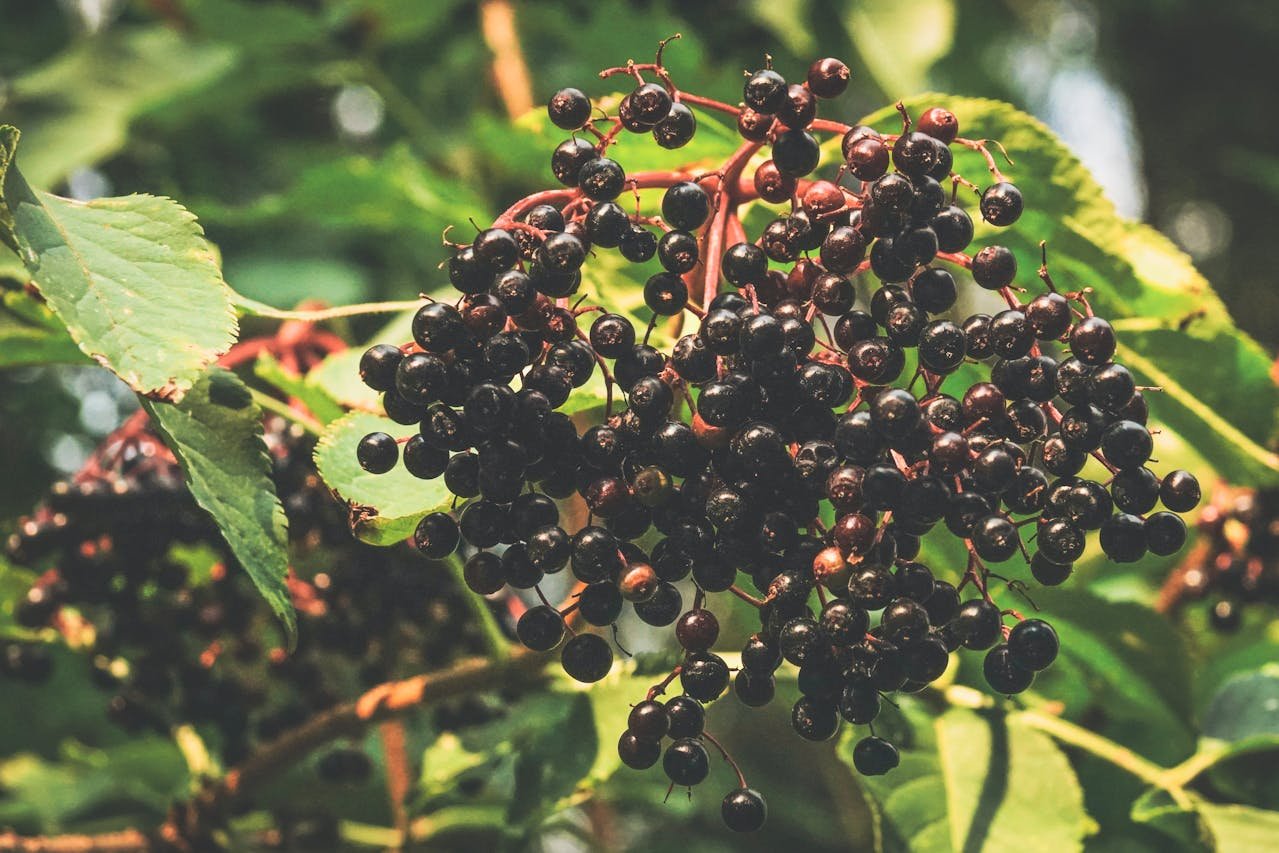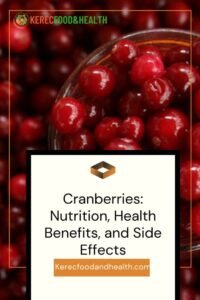Explore elderberries’ types, nutrition, health benefits, and potential side effects to discover how they can enhance your well-being.
Elderberries are a small but mighty fruit packed with nutrients and health benefits that have been cherished for centuries. As you delve into the world of elderberries, you’ll discover that they are rich in vitamins, antioxidants, and minerals that support overall health. Moreover, studies have shown that elderberries can enhance immune function, reduce inflammation, and even alleviate cold and flu symptoms. However, it’s essential to consider potential side effects, especially when consuming raw elderberry or their components. In this blog post, we will explore the nutritional profile of elderberry, their remarkable health benefits, and the precautions you should take to enjoy them safely. Join us as we uncover the power of this extraordinary berry!
Elderberries Nutrition
Elderberries are not only delicious but also packed with essential nutrients that can contribute to overall health.
Nutritional Composition of Elderberries per 100 grams (approximately 3.5 ounces):
- Calories: 73 kcal
- Carbohydrates: 18.4 g
- Dietary Fiber: 7 g
- Sugars: 12.3 g
- Protein: 0.66 g
- Fat: 0.5 g
- Water: 80.2 g
Vitamins
- Vitamin C: 36 mg (60% of the Daily Value)
- Vitamin A: 277 IU
- Vitamin B6: 0.1 mg
- Thiamine (B1): 0.24 mg
- Riboflavin (B2): 0.06 mg
- Niacin (B3): 0.66 mg
- Folate: 48 µg
Minerals
- Potassium: 280 mg
- Calcium: 38 mg
- Magnesium: 18 mg
- Iron: 1.1 mg
- Phosphorus: 52 mg
- Sodium: 1 mg
Antioxidants
Elderberries are particularly rich in antioxidants, including flavonoids (such as quercetin and anthocyanins), which help combat oxidative stress and inflammation in the body.
In summary, elderberries are a nutrient-dense fruit that can enhance your diet and offer numerous health benefits. By incorporating elderberries into your meals or supplements, you can enjoy their delicious flavor while reaping their nutritional rewards.
The Most Common Types of Elderberries
Elderberries are a popular and versatile fruit that has been used for centuries in traditional medicine and culinary dishes. With its dark purple color and distinct taste, it is no wonder that elderberry have gained a lot of attention in recent years. But did you know that there are actually several types of elderberries? In this blog post, we’ll explore the different types of elderberries and their unique characteristics.
It’s important to note that there are two main species of elderberries: Sambucus canadensis, commonly known as American elderberry, and Sambucus nigra, known as European elderberry. While both species have similar health benefits, they have slightly different physical attributes and are found in different parts of the world. Let’s take a closer look at each one.
1. American Elderberry
American elderberry, as the name suggests, is native to North America. It is a tall shrub that can reach up to 12 feet in height and has large clusters of small, dark purple berries. These berries are known for their tart and slightly bitter taste, which makes them ideal for cooking and making jams and syrups. They are also packed with antioxidants and vitamins, making them a popular choice for boosting the immune system and fighting off cold and flu symptoms.
2. European Elderberry
On the other hand, European elderberry is native to Europe, but can also be found in Asia and parts of North Africa. This species is smaller in size compared to the American elderberry, and its berries are darker in color and have a sweeter taste. The European elderberry is also known for its use in traditional medicine, and its flowers are commonly used to make elderberry wine. Like its American counterpart, it is rich in antioxidants and has anti-inflammatory properties.
3. Blue Elderberries
Aside from these two main species, there are also other varieties of elderberries that are gaining attention in the market. One example is the blue elderberry (Sambucus cerulea), which is native to western North America. This variety has blueish-purple berries that are slightly sweeter in taste compared to the American elderberry. It is also known for its use in making jams, jellies, and pies.
4. Red Elderberry
Another variety is the red elderberry (Sambucus racemosa), which is found in North America, Europe, and parts of Asia. This variety has bright red berries and is commonly used in traditional medicine as a diuretic and laxative. However, it is important to note that the red elderberry has toxic compounds in its leaves and stems, so caution should be taken when consuming it.
In conclusion, elderberries are more than just one type of fruit. With its various species and varieties, each one has its own distinctive characteristics and uses. Whether you prefer the tartness of American elderberries or the sweetness of European elderberries, these fruits are a great addition to your diet and can provide numerous health benefits. So the next time you come across elderberries at your local market or in the wild, remember the different types and their unique qualities.
Top 6 Health Benefits of Elderberries
Elderberries, the small dark berries that grow on the elder tree, have been used for centuries in traditional medicine for their numerous health benefits. In recent years, these berries have gained attention in the health and wellness community for their potential to boost immunity and fight against various diseases. In this blog post, we will explore the health benefits of elderberries and the scientific evidence behind them.
1. Rich in Antioxidants
Firstly, elderberries are known for their high concentration of antioxidants which play a crucial role in protecting our cells from damage caused by free radicals. Free radicals are unstable molecules that can lead to chronic diseases such as cancer and heart disease. According to a study published in the Journal of Agricultural and Food Chemistry, elderberry have the highest antioxidant content among all berries, making them a potent weapon in fighting against oxidative stress.
2. Anti-inflammatory Properties
Elderberry also possess strong anti-inflammatory properties. The antioxidants found in elderberries, such as anthocyanins, have been shown to inhibit the production of inflammatory cytokines in the body. A study in the in the Journal of Ethnopharmacology highlighted that elderberry extracts could reduce inflammatory markers, making them beneficial for those with chronic inflammatory conditions. Chronic inflammation is linked to various diseases, including arthritis, heart disease, and diabetes. By reducing inflammation, elderberries may help alleviate symptoms associated with these diseases.
3. Boost the Immune System
One of the most well-known benefits of elderberry is their ability to boost the immune system. They are rich in vitamins A, C, and B6, as well as iron and potassium, and flavonoid, which are essential for maintaining a healthy immune system. Rich in antioxidants, particularly vitamin C and flavonoids, elderberries help protect the body from oxidative stress and inflammation. A study published in the Journal of Medicinal Food found that elderberry extract can enhance the production of cytokines, which are proteins that help regulate the immune response and fight against infections.
4. Treat Respiratory Infections
Moreover, elderberry have been traditionally used to treat respiratory infections, such as the common cold and flu. A study published in the Journal of International Medical Research found that a combination of elderberry extract and Echinacea was effective in reducing the severity and duration of respiratory symptoms. This is due to the presence of compounds in elderberries called flavonoids, which have antiviral properties and can prevent viruses from entering and infecting our cells. Another study published in the Journal of International Medical Research found that elderberry extract significantly reduced the duration and severity of flu symptoms, demonstrating its potential as a natural remedy for respiratory illnesses
5. Improve Heart Health
Furthermore, elderberries can promote heart health. Research indicates that elderberries may help lower cholesterol levels and improve overall cardiovascular function. A study in Nutritional Research reported that elderberry supplementation led to significant reductions in total and LDL cholesterol levels in individuals with elevated cholesterol. By improving cholesterol profiles, elderberries can contribute to better heart health and reduce the risk of cardiovascular diseases.
6. Digestive Health
Additionally, elderberries can support digestive health. The dietary fiber in elderberries aids in digestion and promotes a healthy gut. Fiber helps regulate bowel movements and can prevent constipation. A balanced gut microbiome is essential for overall health, and consuming fiber-rich foods like elderberries can contribute to maintaining a healthy digestive system.
Bottom Line
It is worth noting that while elderberries have numerous health benefits, more research is needed to fully understand their potential in preventing and treating diseases. However, incorporating elderberries into a well-balanced diet can be a great way to boost your overall health and well-being.
Incorporating elderberries into your diet is easy, as they can be consumed fresh or in the form of juice, jam, or supplement. However, it is important to note that raw elderberries contain a compound called cyanogenic glycoside, which can cause nausea and vomiting. Therefore, it is recommended to cook elderberries before consuming them to remove this compound.
In conclusion, elderberries are a powerhouse of nutrients and bioactive compounds that can provide numerous health benefits. From boosting immunity to fighting inflammation, these small berries have a lot to offer. However, as with any natural remedy, it is always best to consult with a healthcare professional before incorporating elderberries into your routine.
Side Effects Of Eating Elderberries
Elderberries are celebrated for their health benefits and delicious flavor, but it’s essential to recognize that they can also have side effects. Being informed about these potential risks will help you enjoy elderberries safely and responsibly. In this post, we will explore the side effects associated with elderberries, including toxicity, allergic reactions, gastrointestinal issues, and interactions with medications.
1. Toxicity of Raw Elderberries
First and foremost, it is crucial to understand that raw elderberries can be toxic if consumed in large quantities. The berries contain cyanogenic glycosides, which can release cyanide when metabolized. This toxicity is particularly concerning when the berries are not cooked. Cooking elderberries eliminates the harmful compounds, making them safe to eat. Therefore, always ensure that you cook elderberries before consumption to prevent symptoms such as nausea, vomiting, and diarrhea.
2. Allergic Reactions
In addition to toxicity, some individuals may experience allergic reactions to elderberries. Symptoms can range from mild to severe, including skin rashes, itching, or gastrointestinal distress. If you are trying elderberries for the first time, start with a small amount and monitor for any adverse reactions. Those with known allergies to similar fruits or plants should exercise caution and consult a healthcare provider if necessary.
3. Gastrointestinal Issues
Moreover, elderberries are high in dietary fiber, which can lead to gastrointestinal discomfort for some people. While fiber is essential for digestive health, consuming large quantities of elderberries may result in bloating, gas, or diarrhea. To minimize these effects, gradually introduce elderberries into your diet and maintain a balanced intake. This approach will allow your digestive system to adjust to the increased fiber.
4. Interactions with Medications
Additionally, elderberries may interact with certain medications, particularly those that affect the immune system. Elderberry extracts can enhance immune function, potentially counteracting the effects of immunosuppressive drugs. If you are taking medications that suppress the immune system or have underlying health conditions, it is wise to consult your healthcare provider before adding elderberries to your diet.
5. Pregnancy and Breastfeeding Considerations
Finally, while elderberry syrup is generally regarded as safe for most people, pregnant and breastfeeding women should exercise caution. The effects of elderberry on pregnancy and lactation have not been extensively studied. Therefore, it is best for expectant or nursing mothers to consult a healthcare professional before consuming elderberries or any elderberry products.
Conclusion
In conclusion, while elderberries offer many health benefits, they also carry potential side effects that should not be overlooked. By being aware of these risks—such as toxicity when raw, possible allergic reactions, gastrointestinal issues, medication interactions, and considerations for pregnancy—you can make informed choices about incorporating elderberries into your diet. Always ensure that you cook elderberries before consumption, start with small amounts, and consult a healthcare provider if you have any concerns. By taking these precautions, you can safely enjoy the delightful flavor and numerous health benefits of elderberries.
References:
1. Wu, X., Beecher, G. R., Holden, J. M., Haytowitz, D. B., Gebhardt, S. E., & Prior, R. L. (2004). Concentrations of anthocyanins in common foods in the United States and estimation of normal consumption. Journal of Agricultural and Food Chemistry, 52(13), 3996-4002.
2. Joubert, E., Winterton, P., Britz, T. J., & Gelderblom, W. C. (2008). Antioxidant and pro-oxidant activities of aqueous extracts and crude polyphenolic fractions of rooibos (Aspalathus linearis). Journal of Agricultural and Food Chemistry, 56(1), 1-8.
3. Barak, V., Halperin, T., Kalickman, I. (2001). The effect of Sambucol, a black elderberry-based natural product, on the production of human cytokines: I. Inflammatory cytokines. European Cytokine Network, 12(2), 290-296.
4. Zakay-Rones, Z., Thom, E., Wollan, T., & Wadstein, J. (2004). Randomized study of the efficacy and safety of oral elderberry extract in the treatment of influenza A and B virus infections. Journal of International Medical Research, 32(2), 132-140.
5. https://www.healthline.com/nutrition/elderberry
6. https://www.britannica.com/plant/elderberry
7. https://www.sciencedirect.com/science/article/pii/S0378874120300604





